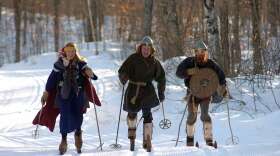Milwaukee County’s green space - some 15,000 acres of parks – is in varied states of decay. A 2009 audit found Milwaukee County Parks facing $200 million in deferred maintenance and the backlog of capital and maintenance needs now total $246 million.
Virginia Small and Tom Tolan teamed up to write about what might be done to bring the luster back to the park system in this month's issue of Milwaukee Magazine.
Small points to Washington Park on Milwaukee’s west side. “We’re standing at the landing of the lagoon just behind the band shell and this is the main feature in many ways of Washington Park,” Small says.
Invasive cattails are taking over a portion of the lagoon and the sweeping landing itself shows signs of neglect.
“It’s not exactly well maintained. I called it ‘composting in place’ because the leaves and the natural debris have just been gathering, possibly for years,” Small says.
Washington Park is not the only park in what the authors describe as “varying states of deterioration.” The Mitchell Park Horticultural Conservatory, a 110-year-old concrete footbridge and Ravine Road beneath in Lake Park, and Boerner Botanical Gardens’ gardens are just a few of the places suffering under neglect.
Just thirty years ago, Milwaukee was considered a model for parks. Over a thousand full-time staff kept the system humming back in 1973. Today 200 people try to keep up with its 158 parks.
“So they can't possibly do the level maintenance that was done (in the past). It’s just a fact,” Small says.
Adding to the challenge, parks funding has been reduced over time.
“The amount of tax money going into the parks has been decreasing and it looks like it’s going to continue to decrease,” Tom Tolan adds. “With worsening shared revenue from Madison and mounting pension and other retiree costs.”
Volunteers have stepped up to try to help.
I think it will take a lot of advocacy and that advocacy can come from many sources, but I think it will be driven by citizens, because they care about these parks, they live in these parks and they belong to all of us.
The Park People was founded in 1977 to help residents to organize groups to support a specific park. Some 50 groups of varying size have formed. They help remove invasive plants, tend trails and organize cleanups.
“Literally putting their sweat equity into improving those parks. So there’s a lot of personal investment in maintaining the parks,” Virginia Small says. “ There are also donations and businesses who are becoming donors to various parks and forming partnerships and all that.”
The parks system is bringing in more money through user fees; golf courses bringing in the most, followed by concessions. Beer gardens represent $1 million annual income.
However, friends groups and beer gardens aren’t enough to maintain all of the parks.
An idea floated back in 2008 has resurfaced. At that time Milwaukee County voters approved an advisory referendum.
“A half-cent sales tax dedicated to funding parks, cultural institutions and perhaps transit,” Tom Tolan explains. “Of course 2008 (when the referendum passed) was the recession and the legislature would have had to authorize the tax and there was no way in doing that at that point.”
Today, the sales tax is again being discussed by local business leaders, although Governor Walker has consistently opposed a tax increase.
Small says pushing through a public-funding solution will likely require a gargantuan lobbying effort.
“I think it will take a lot of advocacy and that advocacy can come from many sources, but I think it will be driven by citizens, because they care about these parks, they live in these parks and they belong to all of us,” says Small. “The idea of stewardship is not that you turn it over to the administration or the county. It’s all of us, so that’s why people are out there pulling those weeds because they want to do something.”






